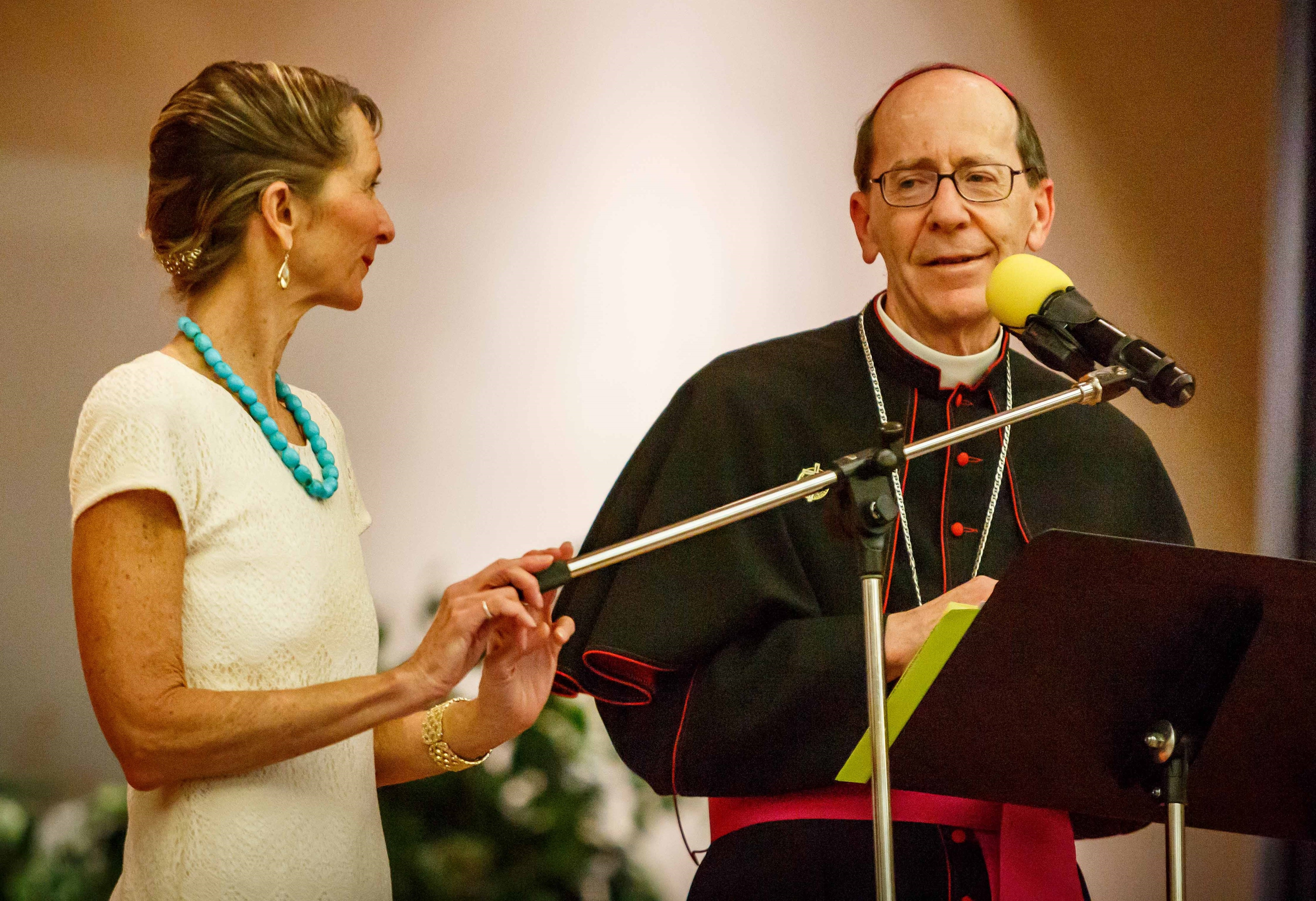Have you ever been on your way somewhere and you became delightfully distracted by another reality, so much so that you had to forsake the path you were on and investigate this new reality? Well, something similar happened with this blog.
For the past couple weeks, I’ve been happily pursuing in this blog a very distinct line of thinking – we’ve reflected on living by the highlights, then living the in-between times, then embracing the path of waiting, then primicia (the “first fruits”) as the promise of something more! All this was but a warm-up for the real topic that fills my every breath – divinization as a participation in Divine Trinitarian Life.
And then something happened on the way to writing about participation – I participated as a responder in a Q&A session on TOB and Gender Identity along with my dear bishop, Bishop Thomas Olmsted (see photo). During the Q&A, a bewildered audience member asked, “How did we get to where we are today? It seems as if it all just happened so fast.” He was referring, of course, to the change in our cultural understanding of marriage, sex, and gender that seems to be overtaking us at a dizzying pace.
I have to admit, his question set off a fire-cracker within me, which then exploded on the audience. After I finished my answer, I thought to myself, “Katrina, you talked way too long.” However, after the Q&A finished, I was unexpectedly showered with expressions of gratitude for explaining how our contemporary confusion didn’t just “happen” overnight, but had been brewing for 700 years.
So, nudged by numerous pleas to put my answer in writing, we will “interrupt this regularly scheduled program” and turn our attention to a very condensed summary of Western thought since the 14th century in order to identify the roots of our modern approach to freedom of choice and to the body as raw material awaiting one’s self-chosen self-construction.
I’m not normally inclined toward creating a type of “visual formula” to explain my talks, but this topic begs a different approach, so here’s the “formula” we’re going to explore:
N DBD N
(M)
Quickly deciphered, it goes like this: Nominalism > Descartes, Bacon, Darwin > Nietzsche (…and Marx). Got it? Here we go!
Our backwards time travel to unravel how we got to where we are today begins in the 14th century with a school of thought called Nominalism. Nominalism emerged as a reaction to the rather complex theological and philosophical systems of scholasticism, most eminently expressed by St. Thomas Aquinas and his Summa Theologica (13th century). This scholastic approach placed a pronounced emphasis on the intellect, deductive reasoning, and carefully articulated distinctions.
In contrast, Nominalism stepped back from investigating God and the world through the lens of the intellect and opted instead for the centrality of the will, what I like to call “God’s BIG WILL.” Similar to Cyrano de Bergerac who was only known for his BIG nose and nothing else (it’s a rare person who knows anything else about Cyrano’s life and personality), Nominalism zeroes in on God’s BIG WILL to the exclusion of His other divine qualities.
How did this happen? A Franciscan friar named William of Ockham (1280-1349) engaged in a series of “thought experiments” about God’s all-powerful will. He asked himself, “Could God command us to hate each other and to hate Him, which would then be the Law?” His answer was yes, because God’s will is the Law, and it can establish what is right and wrong without any need for explanation.
Ockham also asked himself whether God could bring a sinner, deep in mortal sin, to heaven without changing that person inwardly? Again, his answer was yes, because God can produce any effect without needing any assistance (i.e., God doesn’t need any cooperation from us as secondary causes because His will is supreme).
Because Ockham exalted God’s BIG WILL above any other divine attribute, he confronted a rather BIG problem: the clash between God’s all-powerful will and “universals.” Universals, or natures, are interior, organizing structures and features of a thing that it shares with others of its same kind. For instance, all dogs participate in the universal nature of “dogginess.” We know a dog when we see it because it has a dog “nature.” As a result of this nature, all dogs share in common properties and ways of acting – you’ll never encounter a dog that meows or plays the cello but one that barks and buries bones.
So, what’s the BIG deal you might ask? It’s this (at least according to Ockham): If universals (or natures) exist then God is bound to act according to those natures and therefore subject to His own creation. In short, God could no longer be God because He isn’t all-powerful since He is forced to act in a certain way.
Ockham’s solution was to get rid of universals (natures) and to posit that only individual things exist. Consequently, the words we use to refer to these individual things are simply convenient labels. They don’t refer to anything permanent or unchanging in the essence of a thing; they are just arbitrary “names” (Nominalism means “name”) assigned to this or that object. Ockham’s strategy supposedly freed God to act according to His BIG WILL in whatever way He deemed appropriate without interference from universals, natures, permanent interior structures, etc.
The poisonous fruit of Nominalism is twofold: 1) God’s BIG WILL is isolated from the rest of God’s Divine Nature, including Love, Trinitarian Relations, and Intellect expressed in Divine Wisdom embedded in the natural order of creation (what we often call the “natural law”). And 2) Ockham introduced a radical split between language and reality. Since words are merely “names” that refer only to appearances but not to the inner reality of the thing itself, then the relationship between language and reality is arbitrary and superficial. In other words, we don’t encounter the inner reality, essence, or “form” of a thing through language, only its external properties.
Nominalism might have had only a “nominal” effect on Western culture if it hadn’t profoundly influenced Martin Luther (who feared God’s BIG WILL) as well as Renee Descartes and Sir Francis Bacon. Leaving Luther’s influence aside, let’s take a quick tour through Descartes and Bacon.
Renee Descartes (1596-1650) is most famous for his statement, “I think, therefore I am.” To 21st century ears, this observation sounds innocuous. But it isn’t. His statement introduced another radical split into Western thought – the split between consciousness and embodiment. Through Nominalism, reality had already become unhinged from language. Through Descartes, knowledge about reality (epistemology) became unhinged from the things themselves. What is truly real, he maintained, consists only in the ideas in the mind and not in the things themselves. He divided the human person into a “thinking thing” and a “corporeal substance” with the two dimensions only being accidentally related. This led to a disastrous dualism between what is subjective (my intellectual perceptions and judgments) and what is objective (what exists in reality apart from me).
Following directly in the footsteps of Nominalism, Renee Descartes likewise emphasized God as Will. He reasoned that because God’s all-powerful will is his most significant quality, then the most significant attribute of human beings, made in God’s image and likeness, is the exercise of our free will, our freedom of choice. But, here’s the catch: Descartes insisted that God’s will is exalted beyond our human knowledge so that we can’t understand God’s purposes for the created order. We can only understand how things are created (i.e., how things work), but not why things are created. In fact, he said trying to understand the end or purpose for which something was created is useless. In philosophical terms, Descartes ditched final cause.
Let’s try to see the logic behind his statement: If what something is ultimately created for is unknowable to our minds, then it has no built-in purpose or telos. It is simply available as raw material for us to do whatever we want with it. Our mind and our consciousness, rather than God, assign meaning and purpose to all things. We don’t have to be Baby Einsteins to realize how Descartes’ logic breeds a utilitarian and narcissistic approach to the material world since reality has no objective meaning in itself, only subjective reality and value in our minds.
Although often overlooked, Descartes’ motivation was to throw off the “shackles” of Aristotle’s method of studying reality, his metaphysics, that informed the Western intellectual tradition. Nominalism had already jettisoned Aristotle’s “formal cause” – the interior, organizing structure of a thing that gives it a nature or essence – and now Descartes deftly dispensed with final cause by claiming that things have no end or purpose. What is left then? Only material and efficient cause. In other words, we can only know what something is made of (the material cause) and how it functions (the efficient cause) and therefore what we can do with it. Investigating these two questions (“What is something made of?/What are its component parts?” and “How does it work?”) became the dominant preoccupation and urgent imperative of Western science through the experimental method developed by Sir Francis Bacon.
While Descartes was discovering his thinking self in France, Sir Francis Bacon (1561-1626) was busily developing the foundations of modern science through the experimental method, also based on nominalist thinking. From Bacon’s viewpoint, we are rational creatures who have been given dominion over creation (cf. Gen. 1:28) so it is our prerogative to dissect nature and map out its physical laws. By acquiring a vast knowledge of the material world and then combining it with our godlike faculty of willing, Bacon trumpeted that we can become “lords and masters of nature.”
Bacon decisively linked knowledge with power for the Western mind. By accumulating knowledge (through science), we accumulate power (over the natural world). However, this godlike capacity to exercise power over nature is not unqualified, but, according to Bacon, must be enlisted on behalf of the “betterment” of mankind. The loophole in both Descartes’ and Bacon’s logic is gapingly obvious: Who determines what constitutes the “betterment” of mankind? What kinds of limits, if any, can be placed on man’s exercise of his BIG WILL and his subjective decision of what things are “for”?
I think it best to pause here and digest Nominalism, Descartes, and Bacon before pushing on to Darwin and his theory of natural selection. In the meantime, I encourage you to observe how the meaning of both language and our understanding of reality have changed and are manifested intensely in the contemporary conflict over marriage, sex, and gender. These realities no longer have an objective, interior organizing structure that is independent from our own subjective thinking. Rather, they can be changed and modified according to our own individual judgments and perceptions so as to be more “useful” (i.e., efficient cause) to our own goals and personal pursuit of happiness.
The same is true of the body. The purpose of science and technology is to make more options available for our BIG WILL to exercise its capacity of free choice, and any restrictions on this “godlike capacity to choose” is considered limiting and dehumanizing. Language itself has fallen under the modern guillotine of Nominalism as new words and pronouns rapidly multiply to describe self-constructed realities rather than an interior, objective order of reality. The “betterment of mankind” has morphed into the “betterment of the individual self” with the teeth of civil laws to back up one’s perception of self and reality. After all, if, according to Ockham and Nominalism, God could command anything He wanted and make it Law, then why can’t man – made in His image and likeness – do the same?
As you ponder all this, I pray you will experience even more profoundly the words I use at the end of every blog: And remember…you are a gift! (and not just a nominalistic, thinking, choosing thing…)
© Katrina J. Zeno, MTS




